6. Jesus said to him, I am the way, the truth, and the life: no man comes to the Father, but by me.
7. If you had known me, you should have known My Father also; and from henceforth you know him, and have seen him.
AUG. Our Lord had said that they knew both, Thomas says that they knew neither. Our Lord cannot lie; they knew not that they did know. Our Lord proves that they did: Jesus said to Him, I am the way, the truth, and the life.
AUG. As it He said, I am the way, whereby you would go; I am the truth, whereto you would go; I am the life, in which you would abide. The truth and the life every one understands; but not everyone has found the way. Even the philosophers of the world have seen that God is the life eternal, the truth which is the end of all knowledge.
And the Word of God, which is truth and life with the Father, by taking upon Him human nature, is made the way. Walk by the Man, and you will arrive at God. For it is better to limp on the right way, than to walk ever so stoutly by the wrong.
HILARY. For He who is the way does not lead us into devious courses out of the way; nor does He who is the truth deceive us by falsehoods; not does He who is the life leave us in the darkness of death.
THEOPHYL. When you art engaged in the practical, He is made your way; when in the contemplative, He is made your truth. And to the active and the contemplative is joined life: for we should both act and contemplate with reference to the world to come.
AUG. They knew then the way, because they knew He was the way. But what need to add, the truth, and the life? Because they were yet to be told whither He went. He went to the truth; He went to the life. He went then to Himself, by Himself. But did you leave Yourself, O Lord, to come to us? I know that you took upon you the form of a servant; by the flesh you came, remaining where you were; by that you returned, remaining where you had come to. It by this then you came, and returned, by this you were the way, not only to us, to come to you, but also to Yourself to come, and to return again. And when you went to life, which is Yourself you raised that same flesh of Your from death to life.
Christ therefore went to life, when His flesh arose from death to life. And since the Word is life, Christ went to Himself; Christ being both, in one person, i.e. Word-flesh. Again, by the flesh God came to men, the truth to liars; for God is true, but every man a liar. When then He withdrew Himself from men, and lifted up His flesh to that place in which no liar is, the same Christ, by the way, by which He being the Word became flesh, by Himself, i.e. by His flesh, by the same returned to Truth, which is Himself, which truth, even amongst the liars He maintained to death.
Behold I myself, if I make you understand what I say, do in a certain sense go to you, though I do not leave myself. And when I cease speaking, I return to myself, but remain with you, if you remember what you have heard. If the image which God has made can do this, how much more the Image which God has begotten? Thus He goes by Himself, to Himself and to the Father, and we by Him, to Him and to the Father.
CHRYS. For if, He says, you have Me for your guide to the Father, you shall certainly come to Him. Nor call you come by any other way. Whereas He had said above, No man can come to Me, except the Father draw him, now He says, No man comes to the Father but by Me, thus equaling Himself to the Father. The next words explain, Where I go you know, and the way you know.
If you had known Me, He says, you should have known My Father also; i.e. If you had known My substance and dignity, you would have known the Father's. They did know Him, but not as they ought to do. Nor was it till afterwards, when the Spirit came, that they were fully enlightened.
On this account He adds, And from henceforth you know Him, know Him, that is, spiritually. And have seen Him, i.e. by Me; meaning that he who had seen Him, had seen the Father. They saw Him, however, not in His pure substance, but clothed in flesh.
BEDE. How can our Lord say, If you had known Me, you should have known My Father also; when He has just said, Where I go you know, and the way you know? We must suppose that some of them knew, and others not: among the latter, Thomas.
HILARY. Or thus: When it is said that the Son is the way to the Father, is it meant that He is so by His teaching, or by His nature? We shall be able to see from what follows: If you had known Me, you should have known My Father also.
In His incarnation asserting His Divinity, He maintained a certain order of sight and knowledge: separating the time of seeing from that of knowing. For Him, who He said must be known, He speaks of as already seen: that henceforward they might from this revelation have knowledge of the Divine Nature which they had all along seen in Him.
8. Philip said to him, Lord, show us the Father, and it suffices us.
9. Jesus said to him, Have I been so long time with you, and yet have you not known me, Philip? he that has seen me has seen the Father; and how say you then, Show us the Father?
10. Believe you not that I am in the Father, and the Father in me? the words that I speak to you I speak not of myself: but the Father that dwells in me, he does the works.
11. Believe me that I am in the Father, and the Father in me: or else believe me for the very works' sake.
HILARY. A declaration so new startled Philip. Our Lord is seen to be man. He confesses Himself to be the Son of God, declares that, if He were known, the Father would be known, that, if He is seen, the Father is seen. The familiarity of the Apostle therefore breaks forth into questioning our Lord, Philip said to Him, Lord, show us the Father, and it suffices us. He did not deny He could be seen, but wished to be shown him; nor did he wish to see with his bodily eyes, but that He whom he had seen might be made manifest to his understanding. He had seen the Son in the form of man, but how through that form He saw the Father, he did not know. This he wants to be strewn him, strewn to his understanding, not set before his eyes; and then he will be satisfied: And it suffices us.
AUG. For to that joy of beholding His face, nothing can be added. Philip understood this, and said, Lord, show us the Father, and it suffices us. But he did not yet understand that he could in the same way have said, Lord, show us Yourself, and it suffices us. But our Lord's answer enlightens him, Jesus said to him,
Have I been so long with you, and yet have you not known Me, Philip?
AUG. But how is this, when our Lord said that they knew where He was going, and the way, because they knew Him? The question is easily settled by supposing that some of them knew, and others not; among the latter, Philip.
HILARY. He reproves the ignorance of Philip in this respect. For whereas his actions had been strictly divine, such as walking on the water, commanding the winds, remitting sins, raising the dead, He complained that in His assumed humanity, the Divine nature was not discerned. Accordingly to Philip's request, to be strewn the Father, Our Lord answers, He that has seen Me, has seen the Father.
AUG. When two persons are very like each, we say, If you have seen the one, you have seen. n the other. So here, He that has seen Me, has seen the Father; not that He is troth the Father, and the Son, but that the Son is an absolute likeness of the Father.
HILARY. He does not mean the sight of the bodily eye: for His fleshly part, born of the Virgin, does not avail towards contemplating the form and image of God in Him; but the Son of God being known with the understanding, it follows that the Father is known also, forasmuch as He is the image of God, not differing from but expressing His Author. For our Lord's expressions do not spear; of one person solitary and without relationship, but teach us His birth. The Father also excludes the supposition of a single solitary person, and leaves us no other doctrine but that the Father is seen in the Son, by the incommunicable likeness of birth.
AUG. But is he to be reproved, who, when he has seen the likeness, wishes to see the man of whom he is the likeness? No, our Lord rebuked the question, only with reference to the mind of the asker.
Philip asked, as if the Father were better than the Son; and so showed that He did not know the Son. Which opinion our Lord corrects: Believe you not that I am in the Father, and the Father in Me? as if He said, If it is a great wish with you to see the Father, at any rate believe what you do not see.
HILARY. For what excuse was there for ignorance of the Father, or what necessity to show Him, when the Father was seen in the Son by His essential nature, while by the identity of unity, the Begotten and the Begetter are one: Believe you not that I am in the Father and the Father in Me?
AUG. He wished him to live by faith, before he had sight, and therefore says, Believe you not? Spiritual vision is the reward of faith, vouchsafed to minds purified by faith.
HILARY. But the Father is in the Son, and the Son in the Father, not by a conjunction of two harmonizing essences, nor by a nature grafted into a more capacious substance as in material bodies, in which it is impossible that what is within can be made external to that which contains it; but by the birth of a nature which is life from life; forasmuch as from God nothing but God can be born.
HILARY. The unchangeable God follows, so to speak, His own nature, by begetting unchangeable God. Nor does the perfect birth of unchangeable God from unchangeable God forsake His own nature. We understand then here the nature of God subsisting in Him, since God is in God, nor besides Him who is God, can any other be God.
CHRYS. Or thus: Philip, because [he thought] he had seen c the Son with his bodily eye, wished to see the Father in the same way; perhaps too remembering what the Prophet said, I saw the Lord (Isaiah 6:1), and therefore he says, Show us the Father. The Jews had asked, who was His Father; and Peter and Thomas, whither He went; and neither were told plainly. Philip therefore, that he might not seem burdensome, after saying, Show us the Father, adds, And it suffices us: i.e. we seek for no more. Our Lord in reply does not say, that he asked an impossible thing, but that he had not seen the Son to begin with, for that if he had seen Him, he would have seen the Father: Have I been so long time with you, and yet have you not known Me? He does not say, not seen Me, but, not known Me; not known that the Son, being what the Father is, does in Himself fitly show the Father. Then dividing the Persons, He says, He that has seen Me has seen the Father; that none might maintain that He was both the Father and the Son. The words show too that even the Son was not seen in a bodily sense. So if anyone takes seeing here, for knowing, I will not contradict him, but will take the sentence as if it was, He that has known Me, has known the Father. He shows here His consubstantiality with the Father: He that has seen My substance, has seen the Father. Whence it is evident He is not a creature: for all know and see the creature, but not all God; Philip, for instance, who wished to see the substance of the Father. If Christ then had been of another substance from the Father, He would never have said, He that has seen Me, has seen the Father. A man cannot see the substance of gold in silver: one nature cannot be made apparent by another.
AUG. He then addresses all of them, not Philip only: The word that I speak to you, I speak not of Myself. What is, I speak not of Myself, I but, I that speak am not of Myself? He attributes what He does to Him, from whom He Himself, the doer, is.
HILARY. Wherein He neither desires Himself to be the Son, nor hides the existence of His Father's power in Him. In that He speaks, it is Himself that speaks in His own person; in that He speaks not of Himself, He witnesses His nativity, that He is God from God.
CHRYS. Mark the abundant proof of the unity of substance. For He continues; But the Father that dwells in Me, He does the works. As if He said, My Father and I act together, not differently from each other; agreeing with what He said below: If I do not the works of My Father, believe Me not. But why does He pass from words to works? Why does He not say as we might have expected, He speaks the words? Because He means to apply what He says both to His doctrine, and to His miracles; or because His words are themselves works.
AUG. For he that edifies his neighbor by speaking, does a good work. These two sentences are brought against us by different sects of heretics; the Arians saying that the Son is unequal to the Father, because He does not speak of Himself; the Sabellians, that the same who is the Father is the Son. For what is meant, they ask, by, The Father that dwells in Me, He does the works, but, I that dwell in Myself, do these works.
HILARY. That the Father dwells in the Son, show that He is not single, or solitary; that the Father works by the Son, shows that He is not different or alien. As He is not solitary who does not speak from Himself, so neither is He alien and separable who speaks by Him.
Having shown then that the Father spoke and worked in Him, He formally states this union: Believe Me that I am in the Father, and the Father in Me: that they might not think that the Father works and speaks in the Son as by a mere agent or instrument, not by the unity of nature implied in His Divine birth.
AUG. Philip alone was reproved before.
CHRYS. But if this does not suffice to show my consubstantiality, at least learn it from My works: Or else believe Me for the very works' sake. You have seen My miracles, and all the proper signs of My divinity; works which the Father alone works, sins remitted, life restored, and the like.
AUG. Believe then for My works' sake, that I am in the Father, and the Father in Me; for, were we separated, we could not be working together.
12. Verily, verily, I say to you, He that believes in me, the works that I do shall he do also; and greater works than these shall he do; because I go to my Father.
13. And whatsoever you shall ask in my name, that will I do, that the Father may be glorified in the Son.
14. If you shall ask any thing in my name, I will do it.
CHRYS. Having said, Believe for the works' sake, our Lord goes on to declare that He can do much greater than these, and what is more wonderful, give others the power of working them. Verily, verily, I say to you, He that believes in Me, the works that I do, shall he do also; and greater works than these shall he do.
AUG. But what are these greater works? Is it that the shadow of the Apostles, as they passed by, healed the sick; It is indeed a greater thing that a shadow should heal, than that the border of a garment should. Nevertheless, by works here our Lord refers to His words. For when He says, My Father that dwells in Me, He does the works, what are these works but the words which He spoke? And the fruit of those words was their faith.
But these were but few converts in comparison with what those disciples made afterwards by their preaching: they converted the Gentiles to the faith. Did not the rich man go away sorrowful from His words? And yet that which one did not do at His own exhortation, many did afterwards when He preached through the disciples. He did greater works when preached by the believing, than when speaking to men's ears.
Still these greater works He did by His Apostles, whereas He includes others besides them, when He says, He that believes in Me. Are we not to compute any one among the believers in Christ, who does not do greater works than Christ? This sounds harsh if not explained. The Apostle says, To him that believes in Him that justifies the ungodly, his faith is counted for righteousness (Rom 4:5).
By this work then we shall do the works of Christ, the very believing in Christ being the work of Christ, for He works this in us, though not without us. Attend then; He that believes on Me, the works that I do, shall he do also. First I do them, then he will do them: I do them, that he may do them. Do what works but this, viz. that a man, from being a sinner, become just? which thing Christ works in us, though not without us. This in truth I call a greater work to do, than to create the heaven and the earth; for heaven and earth shall pass away, but the salvation and justification of the predestined shall remain.
However, the Angels in heaven are the work of Christ; shall he who works with Christ for his own justification, do greater even than these? Judge any one which be the greater work, to create the just, or to justify the ungodly? At least, if both be of equal power, the latter has more of mercy. But it is not necessary to understand all the works of Christ, when He says, greater works than these shall he do.
These perhaps refers to the works He had done that hour. He had then been instructing them in the faith. And surely it is a less work to preach righteousness, which He did without us, than to justify the ungodly, which He so does in us, as that we do it ourselves. Great things truly did our Lord promise His people, when He went to His Father: Because I go to My Father.
CHRYS. i.e. I shall not perish, but shall remain in My proper dignity, in heaven. Or He means: It is your part henceforth to work miracles, since I am going.
AUG. And that no one might attribute the merit to himself, He shows, that even those greater works were His own doing: And whatsoever you shall ask in My name, that will I do. Before it was, He shall do, now, I will do: as if He said, Let not this appear impossible to you. He that believes in Me, will not be greater than I; but I shall do greater works then than now; greater by him that believes on Me, than now by Myself; which will not be a failing, but a condescension
CHRYS. In My name, He says. Thus the Apostles, In the name of Jesus of Nazareth, arise and walk. , All the miracles that they did, He did: the hand of the Lord was with them.
THEOPHYL. This is an explanation of the doctrine of miracles. It is by prayer, and invocation of His name, that a man is able to work miracles.
AUG. Whatsoever you shall ask. Then why do we often see believers asking, and not receiving? Perhaps it is that they ask amiss. When a man would make a bad use of what he asks for, God in His mercy does not grant him it. Still if God even in kindness often refuses the requests of believers, how are we to understand, Whatsoever you shall ask in My name, I will do? Was this said to the Apostles only? No. He says above, He that believes in Me, the works that I do shall he do also.
And if we go to the lives of the Apostles themselves, we shall find that he who labored more than they all, prayed that the messenger of Satan might depart from him, but was not granted his request. But attend: does not our Lord lay down a certain condition? In My name, which is Christ Jesus. Christ signifies King, Jesus, Savior.
Therefore whatever we ask for that would hinder our salvation, we do not ask in our Savior's name and yet He is our Savior, not only when He does what we ask, but also when He does not. When He sees us ask any thing to the disadvantage of our salvation, He shows s Himself our Savior by not doing it. The physician knows whether what the sick man asks for is to the advantage or disadvantage of his health; and does not allow what would be to his hurt, though the sick man himself desires it; but looks to his final cure.
And some things we may even ask in His name, and He will not grant them us at the time, though He will some time. What we ask for is deferred, not denied. He adds, that the Father may be glorified in the Son. The Son does not do any thing without the Father, inasmuch as He does it in order that the Father may be glorified in Him.
CHRYS. For when the great power of the Son is manifested, He that begot Him is glorified. He introduces this last, to confirm the truth of what He has said.
THEOPHYL. Observe the order in which the glorifying of the Father comes. In the name of Jesus miracles were done, by which men were made to believe the Apostles' preaching. This brought them to the knowledge of the Father, and thus the Father was glorified in the Son.
Catena Aurea John 14


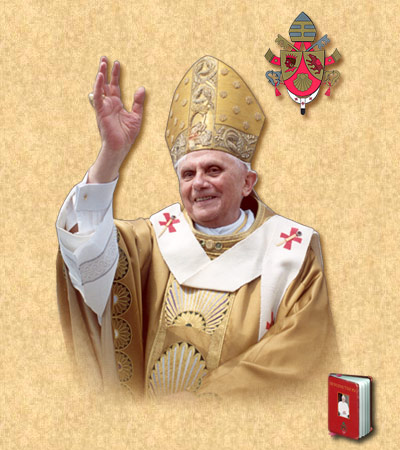



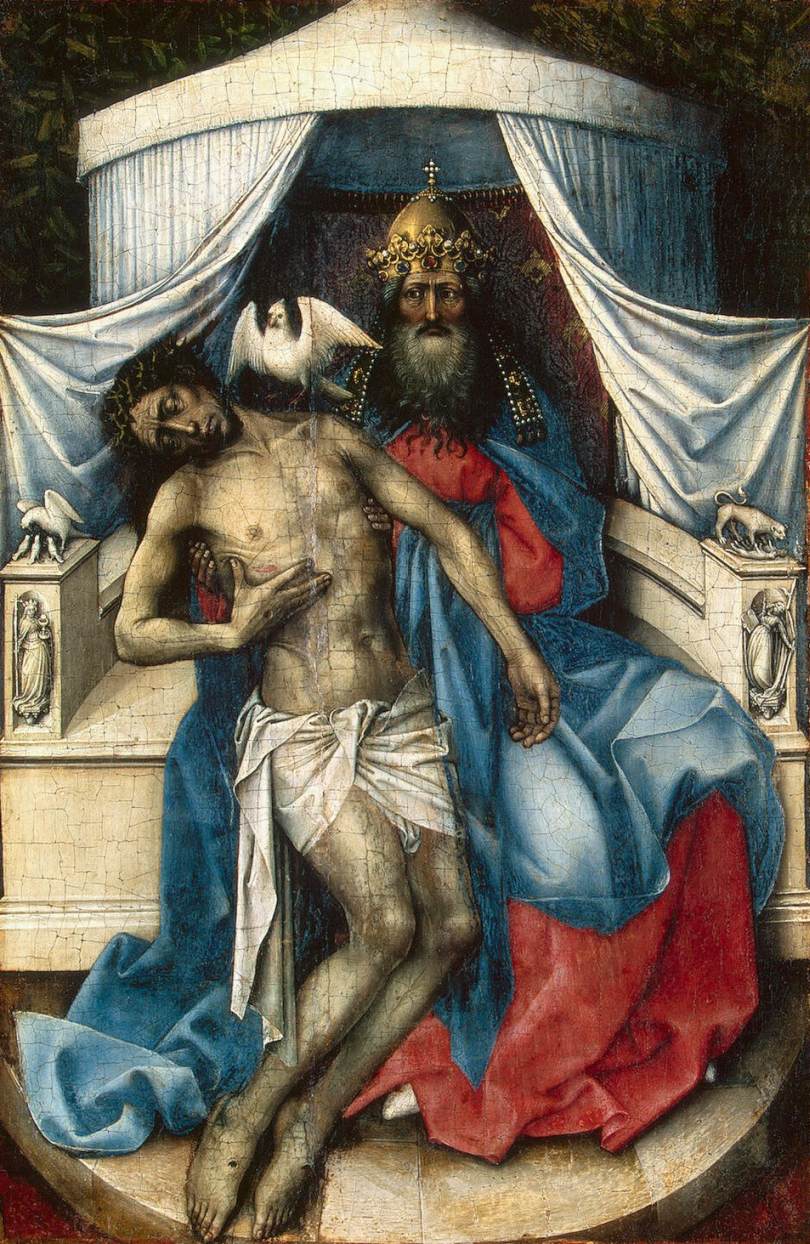
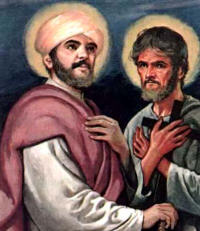
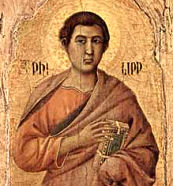 The Apostle Philip was one of Christ's first disciples, called soon after his Master's baptism in the Jordan. The fourth Gospel gives the following detail: "The next day Jesus was about to leave for Galilee, and He found Philip. And Jesus said to him: Follow Me. Now Philip was from Bethsaida, the town of Andrew and Peter. Philip found Nathanael, and said to him: We have found Him of whom Moses in the Law and the Prophets wrote, Jesus the Son of Joseph of Nazareth. And Nathanael said to him: Can anything good come out of Nazareth? Philip said to him: Come and see" (John 1:43ff). — The Church's Year of Grace, Pius Parsch
The Apostle Philip was one of Christ's first disciples, called soon after his Master's baptism in the Jordan. The fourth Gospel gives the following detail: "The next day Jesus was about to leave for Galilee, and He found Philip. And Jesus said to him: Follow Me. Now Philip was from Bethsaida, the town of Andrew and Peter. Philip found Nathanael, and said to him: We have found Him of whom Moses in the Law and the Prophets wrote, Jesus the Son of Joseph of Nazareth. And Nathanael said to him: Can anything good come out of Nazareth? Philip said to him: Come and see" (John 1:43ff). — The Church's Year of Grace, Pius Parsch 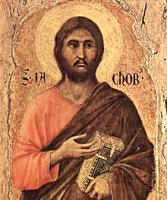 St. James the Less, a brother of the Apostle Jude, was of Cana of Galilee. He is the author of one of the Catholic Epistles in the New Testament. He was favored by an appearance of the Risen Christ (I Cor. 15:7). After the dispersion of the Apostles he was made Bishop of Jerusalem. He was visited by St. Paul (Gal. 1:19). He spoke after Peter at the meeting of the Apostles (Acts 15:13). When he refused to deny the Divinity of Christ, the Jews cast him down from the terrace of the temple and clubbed him to death. The Breviary contains a very moving description of his death. "When he was ninety-six years old and had governed the Church for thirty years in a most holy manner, the Jews sought to stone him, then took him to the pinnacle of the temple and cast him off headlong. As he lay there half dead, with legs broken by the fall, he lifted his hands toward heaven and prayed to God for the salvation of his enemies, saying: Lord, forgive them for they know not what they do! While the apostle was still praying, a fuller struck his head a mortal blow." His relics now rest next to those of St. Philip in the church of the Holy Apostles in Rome, and their names are mentioned in the first list in the Canon of the Mass.
St. James the Less, a brother of the Apostle Jude, was of Cana of Galilee. He is the author of one of the Catholic Epistles in the New Testament. He was favored by an appearance of the Risen Christ (I Cor. 15:7). After the dispersion of the Apostles he was made Bishop of Jerusalem. He was visited by St. Paul (Gal. 1:19). He spoke after Peter at the meeting of the Apostles (Acts 15:13). When he refused to deny the Divinity of Christ, the Jews cast him down from the terrace of the temple and clubbed him to death. The Breviary contains a very moving description of his death. "When he was ninety-six years old and had governed the Church for thirty years in a most holy manner, the Jews sought to stone him, then took him to the pinnacle of the temple and cast him off headlong. As he lay there half dead, with legs broken by the fall, he lifted his hands toward heaven and prayed to God for the salvation of his enemies, saying: Lord, forgive them for they know not what they do! While the apostle was still praying, a fuller struck his head a mortal blow." His relics now rest next to those of St. Philip in the church of the Holy Apostles in Rome, and their names are mentioned in the first list in the Canon of the Mass. 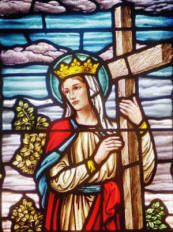 After the victory Constantine gained through the power of the Cross which he had seen in the heavens, and whose sign he reproduced in the Labarum, St. Helena, his mother, went to Jerusalem to try to find the true Cross. At the beginning of the second century, Hadrian had Calvary and the Holy Sepulchre covered over with earth, the top of which became a terrace of 100 feet in length, where were erected a statue of Jupiter and a temple of Venus. The Empress had them razed to the ground, and dug up. The laborers found the nails and three crosses. The miraculous cure of a woman authenticated the sacred tree, to which we owe "life, salvation and resurrection".
After the victory Constantine gained through the power of the Cross which he had seen in the heavens, and whose sign he reproduced in the Labarum, St. Helena, his mother, went to Jerusalem to try to find the true Cross. At the beginning of the second century, Hadrian had Calvary and the Holy Sepulchre covered over with earth, the top of which became a terrace of 100 feet in length, where were erected a statue of Jupiter and a temple of Venus. The Empress had them razed to the ground, and dug up. The laborers found the nails and three crosses. The miraculous cure of a woman authenticated the sacred tree, to which we owe "life, salvation and resurrection". 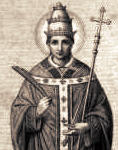 Alexander governed the Church under the Emperor Hadrian. His name is inscribed in the Canon of the Mass. He was martyred at the same time as the priests Eventius and Theodulus, in 117, and their bodies rest in Rome, in the church of St. Sabina, where the Station is held on Ash Wednesday. — Saint Andrew Daily Missal
Alexander governed the Church under the Emperor Hadrian. His name is inscribed in the Canon of the Mass. He was martyred at the same time as the priests Eventius and Theodulus, in 117, and their bodies rest in Rome, in the church of St. Sabina, where the Station is held on Ash Wednesday. — Saint Andrew Daily Missal A priest and physician from the East, he immigrated to Narni, Italy, and was named first bishop of that See by Pope Damasus. Juvenal is reported to have saved Narni from destruction by invading Ligurians and Sarmatians when thousands of the invaders were drowned in a downpour reputedly brought on by his prayers. He was noted for his eloquent preaching, which converted many, and is the patron of Narni. — Dictionary of Saints, John J. Delaney
A priest and physician from the East, he immigrated to Narni, Italy, and was named first bishop of that See by Pope Damasus. Juvenal is reported to have saved Narni from destruction by invading Ligurians and Sarmatians when thousands of the invaders were drowned in a downpour reputedly brought on by his prayers. He was noted for his eloquent preaching, which converted many, and is the patron of Narni. — Dictionary of Saints, John J. Delaney
